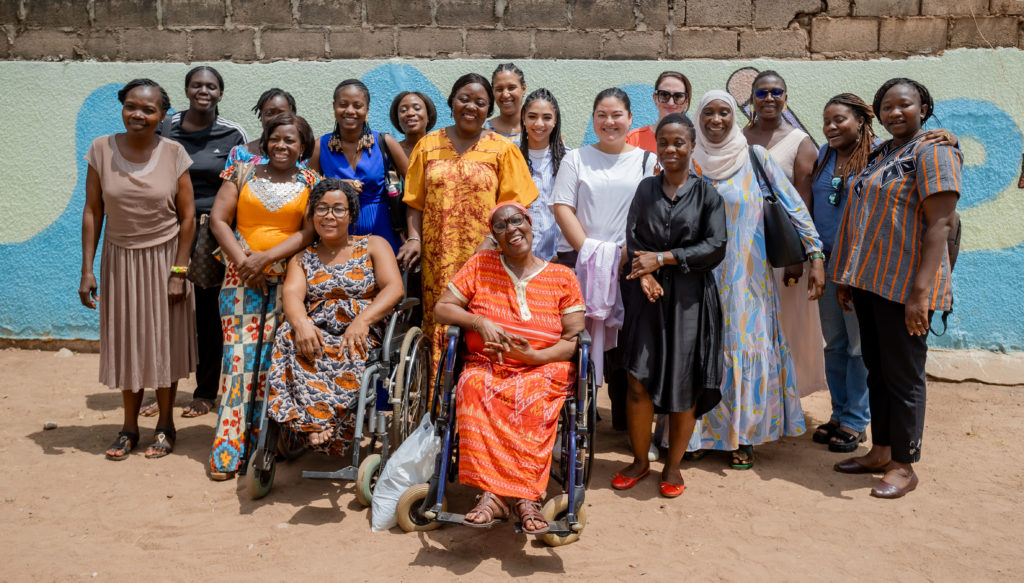May 28 marks two powerful, yet often overlooked global observances: Menstrual Hygiene Day and the International Day of Action for Women’s Health.
Two dates, one observation: health, and even more so menstrual health, remains an area of blatant injustice for millions of girls and women around the world, particularly on our continent.
In many parts of Africa, the lack of access to the essentials for safe menstrual management directly impacts girls’ and women’s safety, dignity, and autonomy. In sub-Saharan Africa, only 45% of adolescent girls are able to practice adequate menstrual hygiene. The challenges are layered — a lack of proper sanitation facilities, access to menstrual products, and even basic information. According to UNESCO, 1 in 10 girls misses school during her period. In Burkina Faso, over half of all women and girls lack access to modern menstrual products, safe toilets, or a hygienic environment to manage their periods with dignity.
Breaking Taboos, Bridging Struggles
Menstrual health cannot be tackled in isolation. Addressing this issue goes far beyond access to pads or basic menstrual education. It requires confronting the compounding challenges of disability, economic vulnerability, and gender norms — all of which deepen inequality.
That’s why, on this symbolic date, we are spotlighting five women-led organizations supported by the Voix EssentiELLEs initiative, each working at the crossroads of menstrual health and broader social change.
Senegal — Menstrual Health & Economic Empowerment
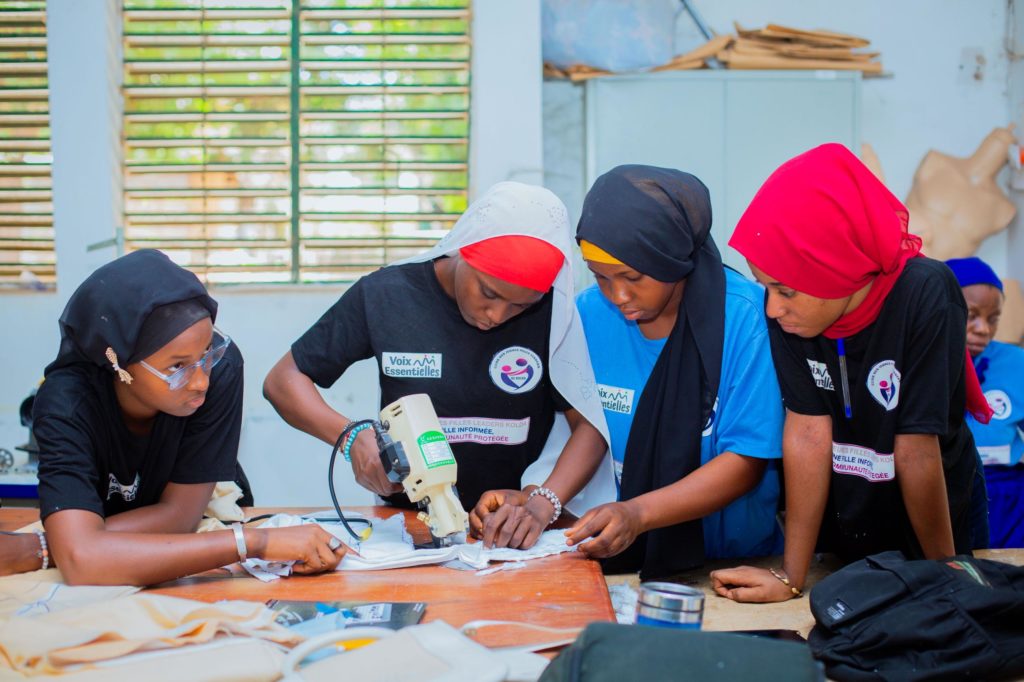
Club des Jeunes Filles de Kolda
In the southern region of Kolda, young girls gather in community clubs to talk about menstrual dignity and professional opportunities. Through panel discussions and workshops on making reusable sanitary pads, they connect sustainable menstrual hygiene with economic empowerment — affirming that period poverty cannot be addressed without economic justice.
Benin — Menstrual Health & Inclusive Digital Communication
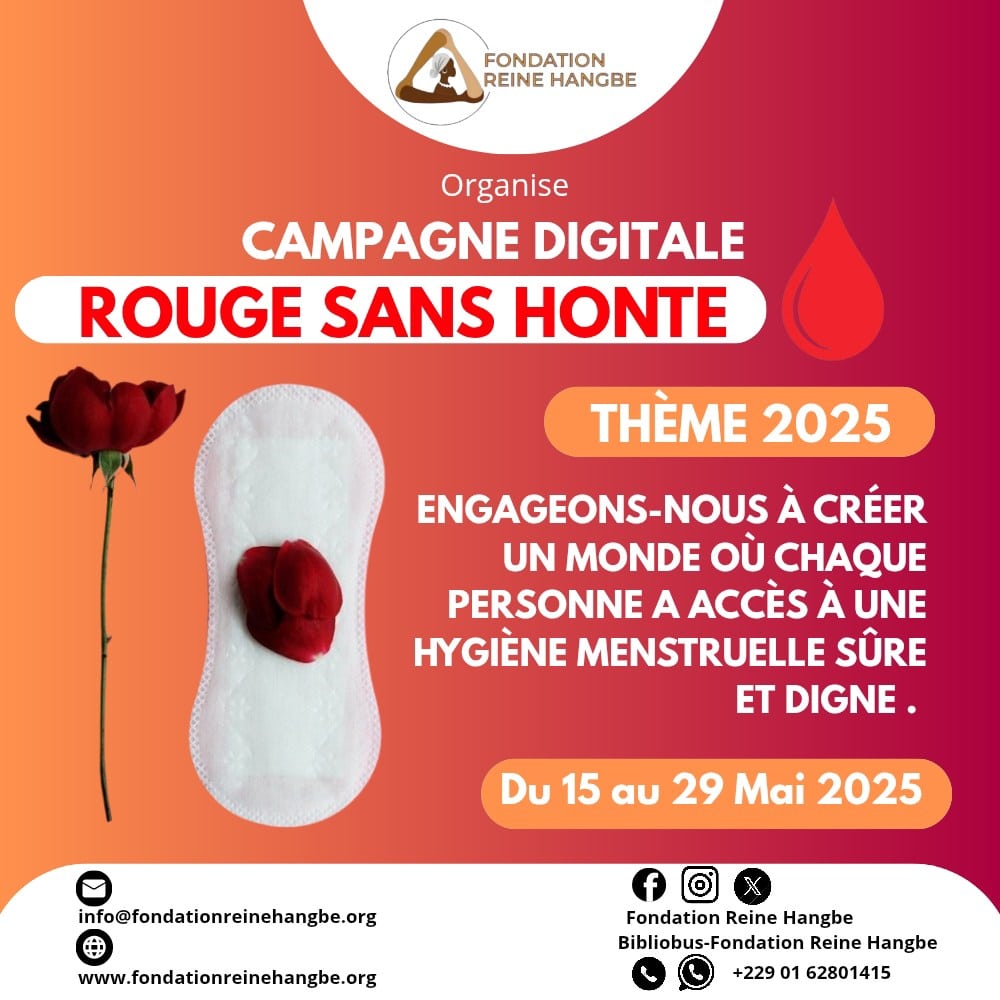
Fondation Reine Hangbe
With their bold campaign “Rouge Sans Honte” (Red Without Shame), the organization took to social media to reach youth, break taboos, and challenge myths. Their approach is modern, visual, and deeply rooted in women’s lived realities.
Côte d’Ivoire — Menstrual Health, Community & Media Mobilization
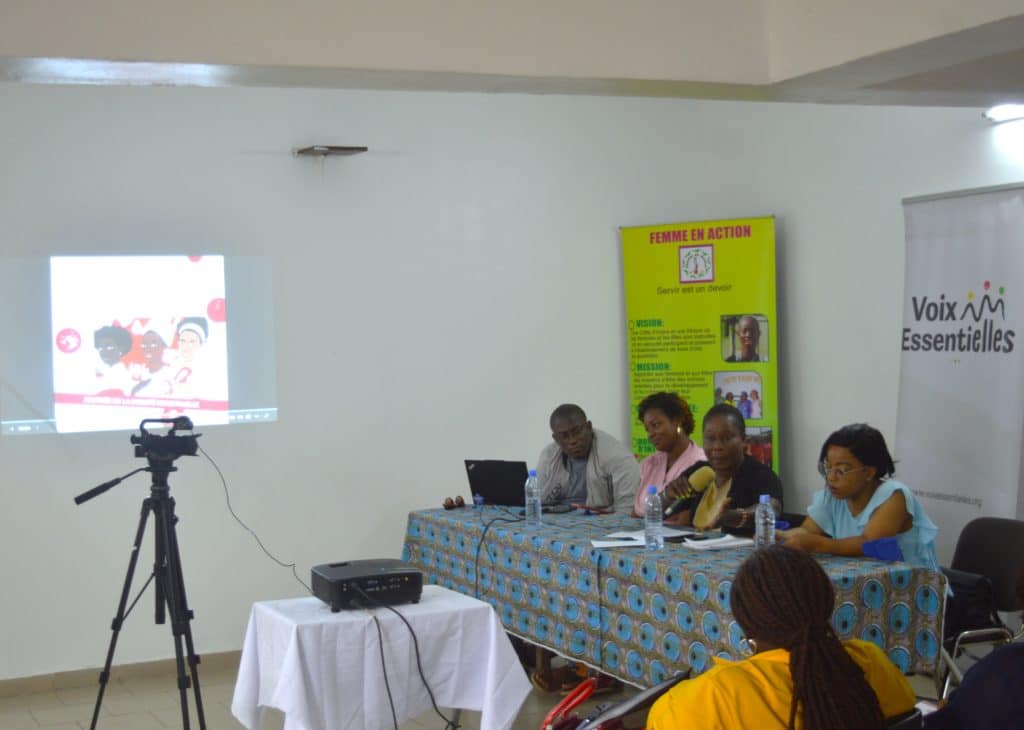
CACI, Overcome Women & Femme en Action
In Abidjan and Divo, the “Week of Periods” gives women a platform through community forums, advocacy events, and media campaigns. Partnering with journalists to promote Comprehensive Sexuality Education (CSE) in schools helps foster emotional development and healthier behaviors among youth.
Togo — Menstrual Health & Disability
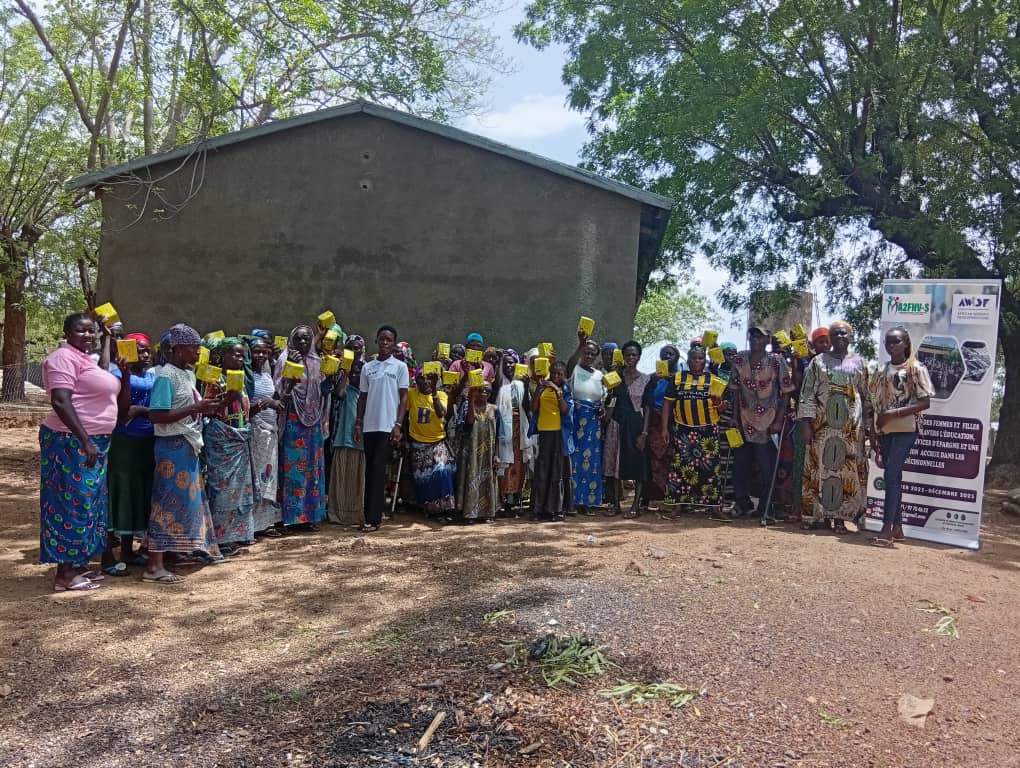
Association des Femmes et Filles Handicapées Vaillantes (Savanes region)
In Dapaong, 50 women and girls living with disabilities participated in a training and awareness session — receiving hygiene kits and a safe space to share. This initiative highlights a double stigma too often left unspoken: disability and menstruation.
Burkina Faso — Menstrual Health & Educational Innovation
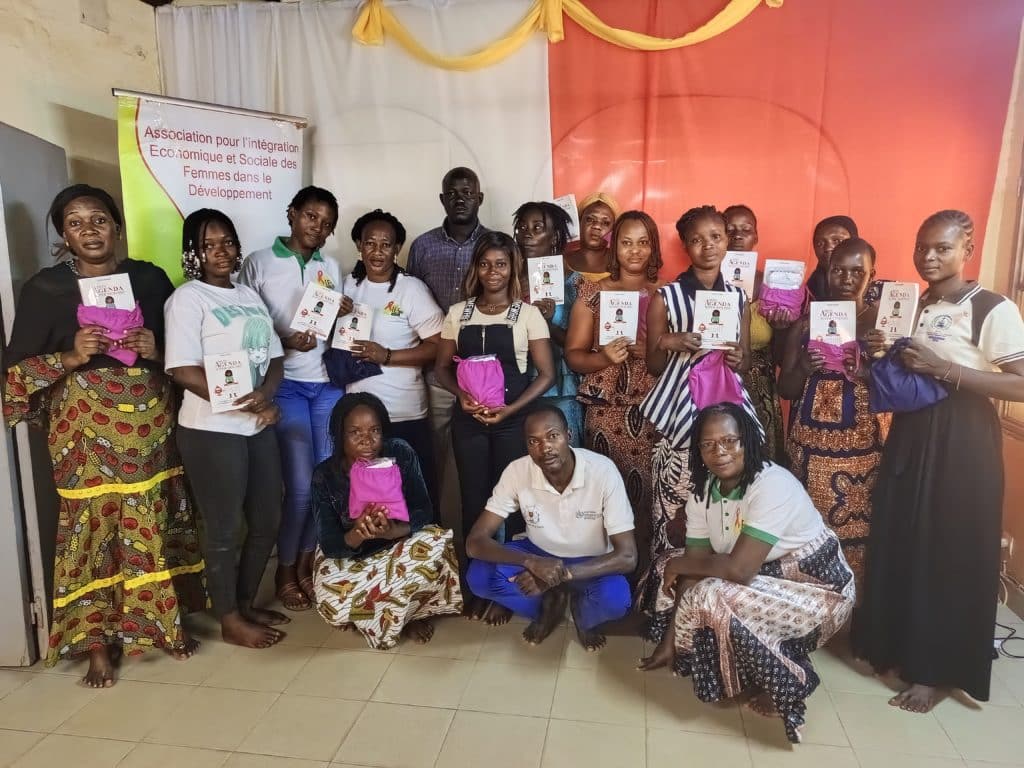
IES Femmes
In Ouagadougou, menstrual health becomes a gateway to digital empowerment. Through hands-on workshops, women are introduced to available menstrual products and taught how to use digital tools to better understand and manage their cycles — turning menstruation into an entry point for information access and autonomy.
Investing in Women’s Health is Investing in Society
These five stories of community leadership reflect the broader mission of the Voix EssentiELLEs Fund: to resource and amplify local women-led solutions that are both systemic and sustainable. Since 2021, our support has gone beyond short-term aid. We’re building bold, rooted, structural responses by and for women.
Because periods should never be a barrier.
Because women’s health is not optional.
Because change begins when we listen to those leading it.
Together, let’s build a world that respects the rules.
From May 6 to 8, 2025, Nairobi played host to the Evidence for Development Conference , a strategic gathering of researchers, decision-makers, practitioners and community leaders with a common goal: to advance Africa's development agenda through data-driven solutions driven by Africans themselves.
In this context, the session entitled "How can equity and inclusion accelerate Africa's progress towards Agenda 2063?" gave the floor to committed figures in research, health and development. Among them, Amanda Sawadogo, General Secretary of theAssociation de soutien aux enfants et femmes vulnérables in Burkina Faso and member of the Voix EssentiELLES network, delivered a powerful speech on behalf of communities who, all too often, remain on the margins of decision-making.
Making science accessible, representative and useful
Amanda opened the discussion by highlighting the persistent imbalances that hinder equitable access to research and innovation. For if science has the power to transform our societies, it must be produced and shared equitably.
Noting that discussions and decisions on research and study areas and themes often fail to include local knowledge and women's perspectives, Amanda draws up a list of urgent actions that need to be taken to integrate these community experiences into the design of development projects.
In her view, Africa must regain control of its scientific production, which means :
This message is fully in line with the ambitions of Agenda 2063, which recognizes science, technology and innovation as pillars of the continent's socio-economic transformation.
Rebalancing power relationships for inclusive governance
Beyond the research, Amanda focused on the systemic barriers that still hinder the access of young people, women and people living with disabilities to decision-making spaces. All too often, leadership is reserved for an elite that meets implicit criteria: age, social status, physical validity, male gender.
Through her experience with the Global Fund's CCM in Burkina Faso and as French-speaking focal point for the Learning Hub "Community, Rights and Gender" of the Réseau d'Accès aux Médicaments Essentiels (RAME), she embodies a new generation of community leaders for whom it's no longer a question of simply being present around the table, but of really weighing in on decisions. In addition to the introduction of binding quotas, we also need to provide communities with genuine support in these areas of governance, to maximize their advocacy and ensure that the specific needs of populations are genuinely taken into account in policy-making and budget allocation.
Empowering communities to create change
Finally, Amanda insisted that sustainable solutions emerge from the communities themselves, provided they are listened to, funded and involved from the outset. She called for:
For her, the Voix Essentielle initiative is a concrete example of this approach: by entrusting community organizations with the means to deliver grassroots solutions, the program demonstrates that impact comes first and foremost through trust, direct funding and active listening to real needs.
Equity is not an extra: it's the condition for progress
Through her speech, Amanda reaffirmed a strong conviction shared by all Speak Up Africa programs:
"To fully realize Agenda 2063, it is essential to trust local skills, foster inclusive policies, and amplify the voices of those who innovate every day in the service of the continent."
Far from abstract speeches, Amanda Sawadogo reminds us that Africa's future lies in its ability to listen to, equip and trust its communities.
In 2023, Africa accounted for 94% of global malaria cases, and 95% of deaths related to the disease also came from the continent. Approximately two-thirds of malaria cases and deaths worldwide are concentrated in 11 African countries, where many people at risk still lack access to the services needed to prevent, detect, and treat the disease.
In reducing the burden of malaria and rapidly eliminating this scourge, addressing gender inequality must be a central focus. Faster results can be achieved by integrating more activities into malaria programs aimed at improving decision-making power, education, and women’s empowerment. Although women are particularly vulnerable to malaria and its consequences, they also play a crucial role in the fight against the disease by taking on various responsibilities, both in providing care and in community awareness efforts.
Within the Voix EssentiELLES project, the fight against malaria occupies a strategic place. The initiative's catalytic fund enables effective advocacy through approaches rooted in local realities to build stronger, more resilient communities.
World Malaria Day is a key moment to remind us that the battle against this disease is far from over. Following this event, Voix EssentiELLES aims to highlight the commitments of four organizations in its new cohort in Benin and Togo, whose pre-existing work on malaria lays the foundation for high-potential advocacy.
Diverse Approaches, a Shared Commitment
In contexts often marked by traditional beliefs, self-medication, and a lack of information, community organizations in Benin and Togo have developed rich and adapted strategies. In Benin, the Reine Adjignon Natabou Foundation, led by the Queen of Toviklin, fights against the stigma and harmful practices related to malaria, mobilizing religious and traditional leaders to encourage preventive behaviors.
In Benin, the Fondation Reine Adjignon Natabou, chaired by the Queen of Toviklin, fights against the stigmatization and deviant practices associated with malaria, mobilizing religious and traditional leaders to encourage preventive behavior. For its part, Icône 360° has innovated by contributing to flagship campaigns such as "Zero injections - Zero malaria" and the creation of anti-malaria clubs in schools, relying on youth as a vector for change. With Voix Essentielles, an advocacy campaign targeting public, community and religious authorities to improve maternal health.
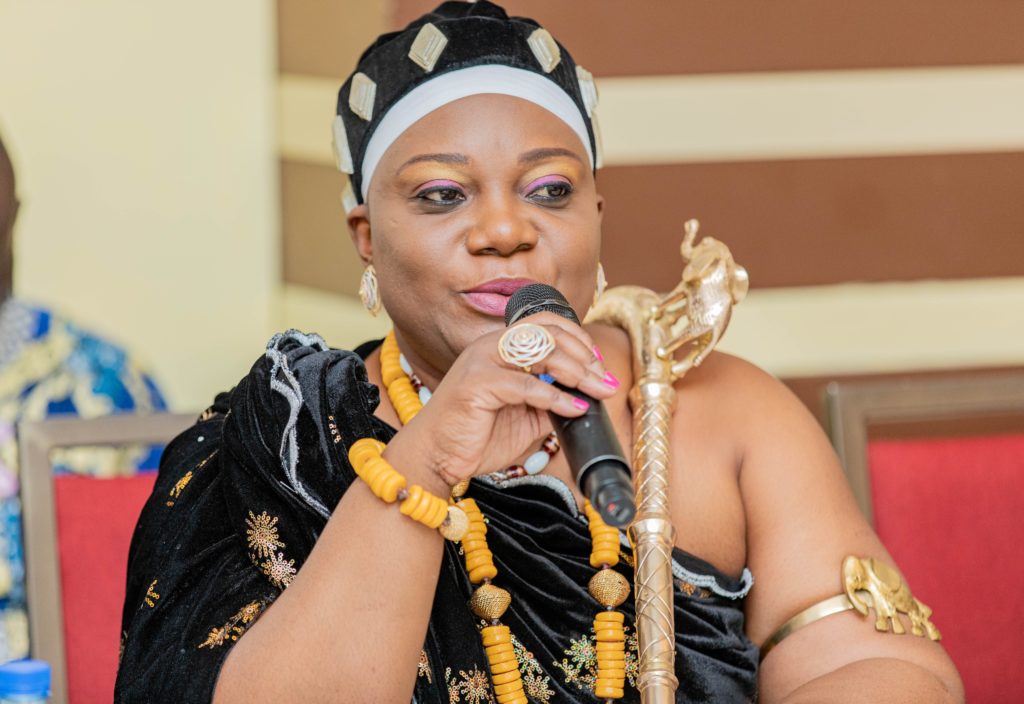
In line with this commitment, Icône 360° President Alavo Sessi Yvette represented CSOs on World Malaria Day in Benin with an information and mobilization stand, in her capacity as President of the National Coalition of Zero Malaria CSOs and Advisor to the Global Fund's CCM/INC. This positioning confirms the bridging role that these community leaders can play between local dynamics and national and international decision-making bodies.
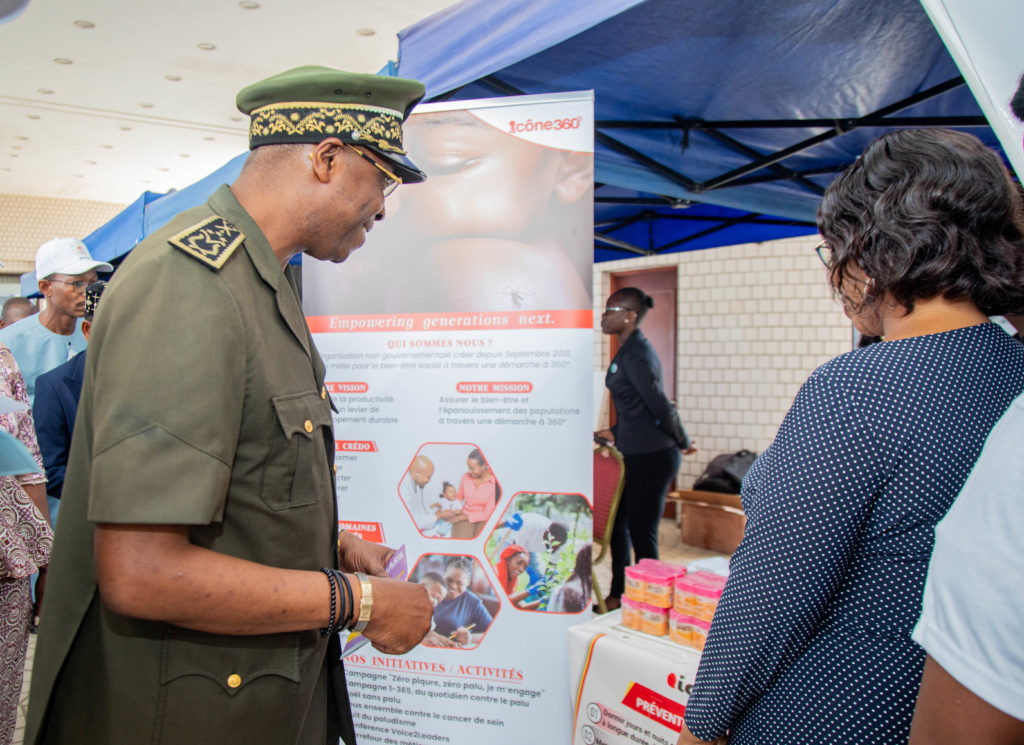
In Togo, Dimension Humaine, led by Rachel Boyindjo, a member of C4SME (Civil Society for Malaria Elimination), benefits from two decades of experience in community sensitization, which she aims to leverage for advocacy focused on reducing access barriers for healthcare workers in the communities.
Malaria is a reality that ravages our communities and dramatically affects our daily lives. I urge national leaders to multiply efforts in mobilizing domestic resources for health, and especially for the fight against malaria. Rachel Boyindjo - Dimension Humaine
The Circle of Actions for the Development and Empowerment of Women and Children(CADEFE), chaired by ESSEH Afua Kafui, operates in the heart of the rural communities of the Plateaux region, where prevalence remains high, focusing on mass awareness and supporting women and young girls.
From Local Actions to Advocacy Ambitions
These organizations, each employing different approaches, share a common belief: malaria is a conquerable scourge, provided that action is taken close to the people, focusing on education, community mobilization, and dialogue with local authorities.
These experiences demonstrate how, starting from their local realities, these organizations can carry powerful advocacy messages to improve public health policies, influence local budget priorities, and deeply integrate prevention practices into community behavior.
Supporting and Amplifying the Voices of Change Makers
By recognizing the women leaders driving this fight, Voix EssentiELLES reaffirms its commitment: to acknowledge the strength of community organizations led by women and provide them with the tools to turn their actions into systemic change.
Through advocacy funding, capacity building, and creating spaces for influence, Voix EssentiELLES will support these organizations in amplifying their impact. Every trained community relay, every influenced local budget, and every myth debunked brings us closer to a common goal: a future where malaria is no longer an inevitable reality for women, girls, and the communities they serve.
By Farida Tiemtore, Founder of Héroïnes du Faso, Voix EssentiELLEs of Burkina Faso and Member of the Global Fund Youth Council
Every April 25, World Malaria Day offers us an opportunity to mark the progress made, but also to remember that the disease continues to kill, particularly in low- and middle-income countries. The year 2025 is decisive for the fight against malaria. Several threats are converging: a freeze on US funding, an increase in health and humanitarian crises, and the major challenge represented by the 8ᵉ replenishment of the Global Fund, scheduled for the end of the year. More than ever, it is crucial to place communities, women and young people at the heart of the global response.
It was in this spirit that I took part in the GFAN (Global Fund Advocates Network) meeting, held in Ottawa from April 7 to 10, 2025. It was a high point for dialogue and mobilization, and as an Essential Voice, I stressed the importance of making the realities of communities heard in international decision-making forums.
"The GFAN 2025 meeting in Ottawa made one thing very clear: we cannot win this battle against malaria, HIV and tuberculosis without the commitment of all stakeholders. From communities to parliamentarians, from young people to political decision-makers, everyone has an essential role to play. The upcoming replenishment will only be successful if it reflects the voices, needs and solutions carried from communities to the highest levels of decision-making, " emphasized GFAN Director Katy Kidd Wright.
Francophone pre-conference to refocus regional priorities
Before the main GFAN meeting, I took part in a Francophone pre-conference. It was an excellent opportunity for sharing, mobilizing and coordinating players from French-speaking countries involved in the fight against disease. We discussed ways of amplifying the voice of French speakers within GFAN, who are often under-represented in global advocacy strategies.
A major point of attention was the need to adapt advocacy approaches to Francophone contexts, taking into account cultural realities, language barriers, but also the specific priorities of the countries concerned. On this occasion, I stressed how essential it was to integrate cross-cutting issues such as women's empowerment, sexual and reproductive health, and the fight against gender-based violence (GBV) into responses to malaria. These dimensions are inseparable from overall health, particularly in contexts where women and girls face multiple vulnerabilities.
Communities at the heart of the response
A central message of this GFAN meeting was the need to make the voices of communities heard. After all, they are the ones who know the realities of the disease, who suffer its consequences, but also who come up with concrete solutions. The Essential Voices, in particular, were highlighted as the driving force behind the co-construction of effective strategies. Women and young people play a central role in this response. They are the ones who take care of families, carry out prevention initiatives, and can be the driving force behind local innovations. It is therefore imperative that they are actively included in international decision-making processes, particularly in the governance of the Global Fund.
" If we really want to defeat malaria, we need to rethink the way we finance the response. Traditional mechanisms are no longer sufficient. The Voix EssentiELLEs initiative is a concrete illustration of this: it not only builds the capacities of women and young people at grassroots level, but also empowers them to propose and implement solutions adapted to their own contexts. This model demonstrates that community-centered, gender-sensitive and trust-based financing is not only possible, but above all effective. It 's time for these approaches to be systematically integrated into international health governance, notably through the Global Fund, " said Maelle Ba, Communications and External Relations Advisor at Speak Up Africa and co-chair of the RBM Partnership to End Malaria's Advocacy, Communications and Resource Mobilization Partners Group.
Major challenges: frozen funding and multiple crises
One of the major obstacles raised during the meeting was the freeze on US funding for global health. The United States, a long-standing player and the Global Fund's main donor, has suspended part of its support. This situation directly jeopardizes the progress made in the fight against malaria, but also against HIV/AIDS and tuberculosis. This funding freeze comes against a backdrop of simultaneous humanitarian and health crises: COVID-19, Mpox, geopolitical conflicts, population displacements, and the growing effects of climate change. Together, these factors are weakening healthcare systems and making the need for greater international support all the more urgent.
" We are facing a convergence of crises - health, humanitarian, climatic and geopolitical - which are putting unprecedented pressure on healthcare systems, particularly in the most vulnerable countries. In this complex context, the risks of regression are real. Without a renewed collective commitment and resources commensurate with needs, hard-won advances in the fight against HIV, tuberculosis and malaria could quickly be wiped out. It is imperative that we reinforce our joint efforts, promote more sustainable and inclusive financing approaches, and support community players who are on the front line. More than ever, international solidarity is not an option, but a vital necessity to preserve the progress made and build resilient health systems, " said Françoise Vanni, Director of External Relations and Communications at the Global Fund.
Prioritizing the fight against malaria at national level
African countries, which continue to bear the heaviest burden of malaria, must now reassert their leadership in the fight against this disease. At a time when international funding is dwindling, it is essential to reinvest more endogenous resources and make the fight against malaria a national priority. This implies a strong political commitment, increased funding from national budgets, and a sustainable strengthening of health systems.
The theme of World Malaria Day 2025, "Reinvesting, reimagining and rekindling our common efforts to end malaria", reminds us of the urgent need for collective and renewed mobilization. This means not only rethinking current strategies, but also rekindling the ambition to eradicate this disease with more resilient approaches, adapted to local realities. In this context, initiatives such as Voix Essentielles or catalytic funds can provide support, but they cannot replace a real willingness on the part of the most affected countries to commit themselves, by investing domestic resources and taking strong decisions. The Global Fund's 8ᵉ replenishment, scheduled for the end of the year, will be an important moment, not to perpetuate a dependence on external aid, but to encourage a renewed and balanced commitment between technical partners and endemic countries.
Multilateralism as a lever for concrete solutions
I also took part in a panel on multilateralism, where we discussed how international cooperation can accelerate the fight against malaria. Multilateralism enables governments, international organizations, civil society and the private sector to act together, in a coordinated way, to meet public health challenges, but this model, as it stands today, is beginning to run out of steam. The panelists put forward some concrete avenues: creating more flexible financing mechanisms, strengthening community care networks, and stepping up awareness-raising efforts in high-risk areas. But above all, it was stressed that decisions must be made with communities, not for them.
Strengthening Francophone voices and participation in governance forums
In this spirit, Voix Essentielles actively participates in GFAN's Francophone calls, which have become a strategic space for updating, exchanging and coordinating global health advocacy. These calls are essential to ensure that the realities of French-speaking countries are taken into account at all levels. Upcoming priorities also include the 53ᵉ Global Fund Board meeting, a key moment to ensure that the delegations representing us effectively defend our voices, needs and priorities. It is essential that decisions taken at this level reflect the realities of communities, and not just political or institutional considerations.
Together for a malaria-free future
The fight against malaria cannot be won without collective commitment, stronger support for communities, and renewed political will. Women, young people and local communities must be recognized as players in their own right, not merely as beneficiaries. To succeed, we need sustainable funding, ambitious international cooperation and equitable representation of community voices in all decision-making bodies. On this World Malaria Day, let us remember that the end of malaria is possible if we place people, social justice and equity at the heart of our actions.
Voix EssentiELLES is an ambitious initiative coordinated by Speak Up Africa, with the invaluable support of the CHANEL Foundation. Its aim is to amplify the voice and active participation of women and girls in decision-making on health and human rights.
The first phase, which ended in 2024, enabled 38 community organizations in Senegal, Burkina Faso and Côte d'Ivoire to successfully carry out advocacy actions and activities on key issues such as gender-based violence, sexual and reproductive health, HIV, tuberculosis and malaria.
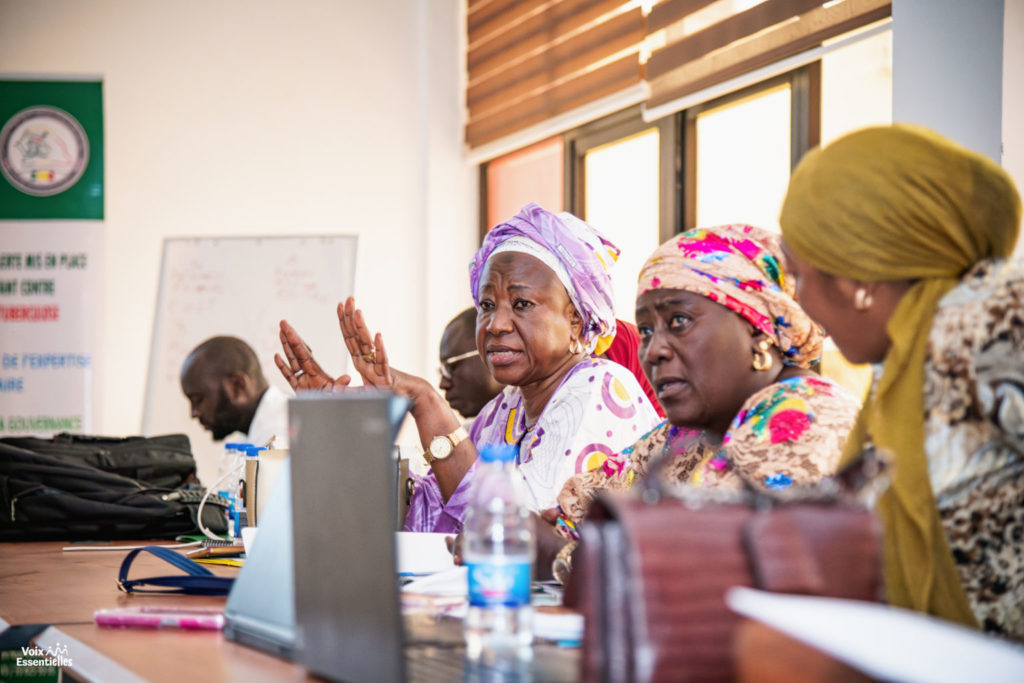
Phase 2 launched in Senegal, Burkina Faso and Côte d'Ivoire
After a successful phase 1, the Voix EssentiELLES initiative entered its second phase with strategic workshops held in Senegal, Burkina Faso and Côte d'Ivoire in February 2025. These meetings enabled the beneficiary organizations to exchange views on the results achieved previously, to take note of the recommendations resulting from the evaluation of the first phase, and to explore together the strategic directions needed to continue and amplify their impact.
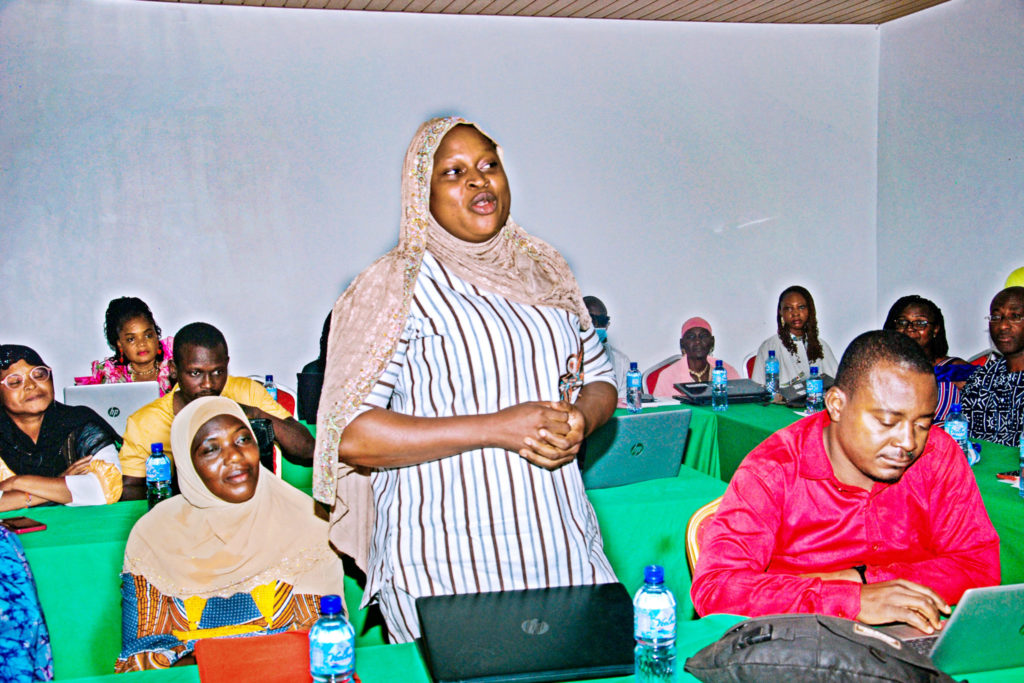
Among the priority issues identified at these meetings were the importance of carrying out concerted actions in national networks, strengthening synergies between organizations, and increasing collective mobilization to effectively influence public policies in favor of health and gender equity. New collective objectives were also defined, including the need to intensify advocacy actions to positively influence public policies in favor of women and girls.
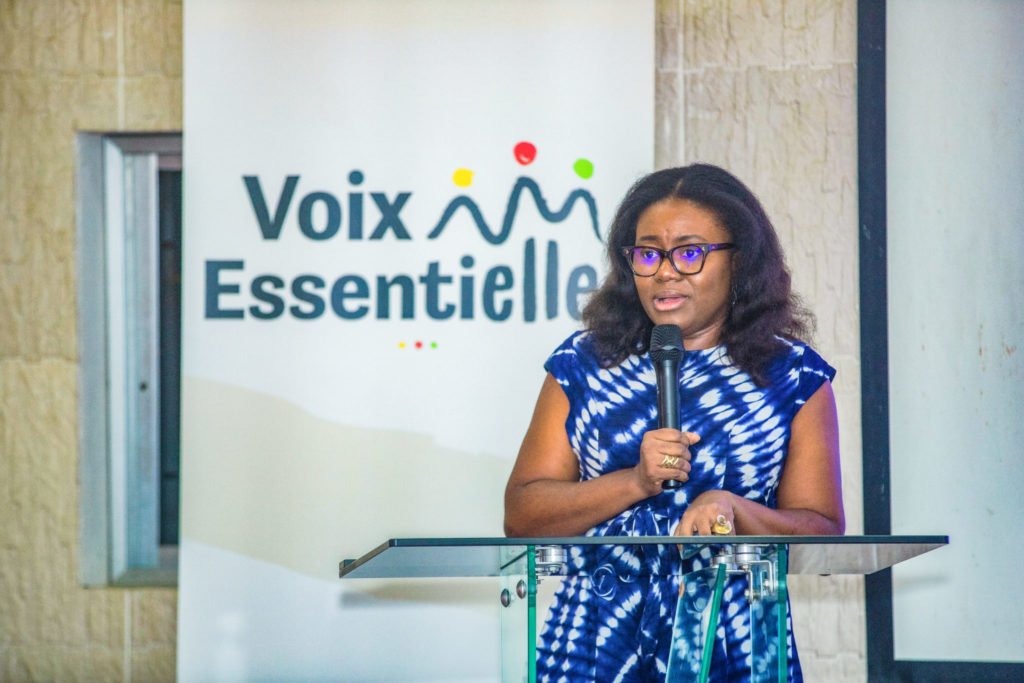
In Côte d'Ivoire, this dynamic was enriched by complementary strategic visits. A meeting with Dr Danielle Adjafi, President of the CCM, provided an opportunity to discuss the challenges of coordinating CSOs and strengthening collaboration. In addition, an exchange with the head of the Programme National de Lutte contre les Violences Basées sur le Genre (PNLVBG) explored opportunities for collaboration with Voix EssentiELLES organizations around key events.
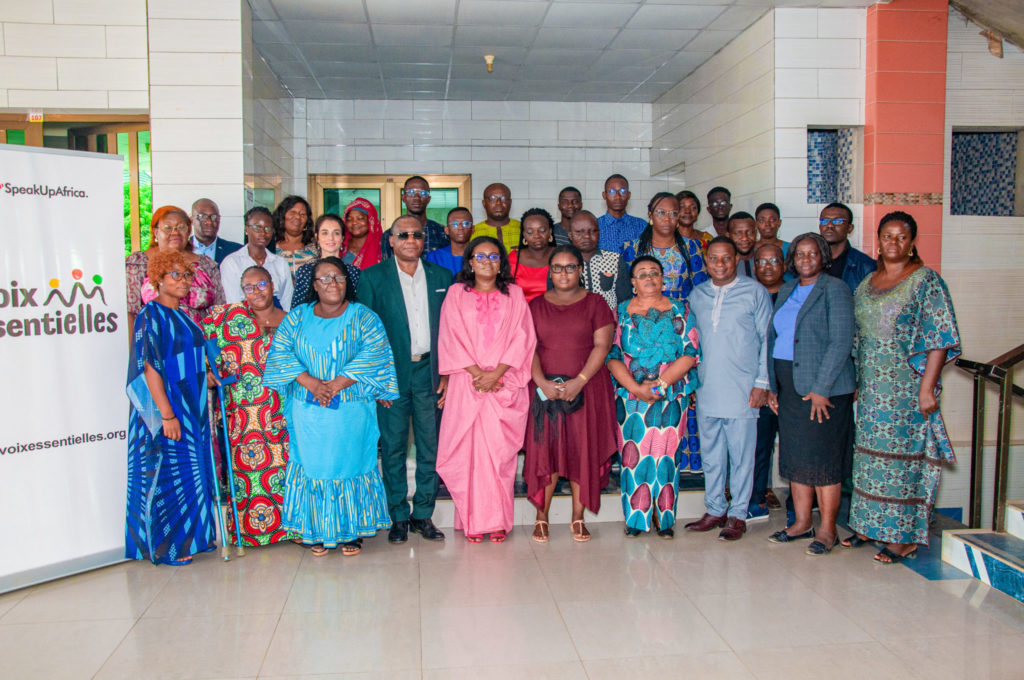
Voix EssentiELLES takes root in Togo and Benin
The project entered a new phase with the expansion into Togo and Benin, with a total of 20 new beneficiary organizations (10 in each country). In Lomé, on March 6 and 7, then in Cotonou, on March 10 and 11, the newly integrated organizations were able to discover the strategies and orientations of the second phase. These meetings also provided an opportunity to identify strategic partnerships with local and international institutional players, consolidating a strong momentum in favor of women's inclusion in these two new countries.
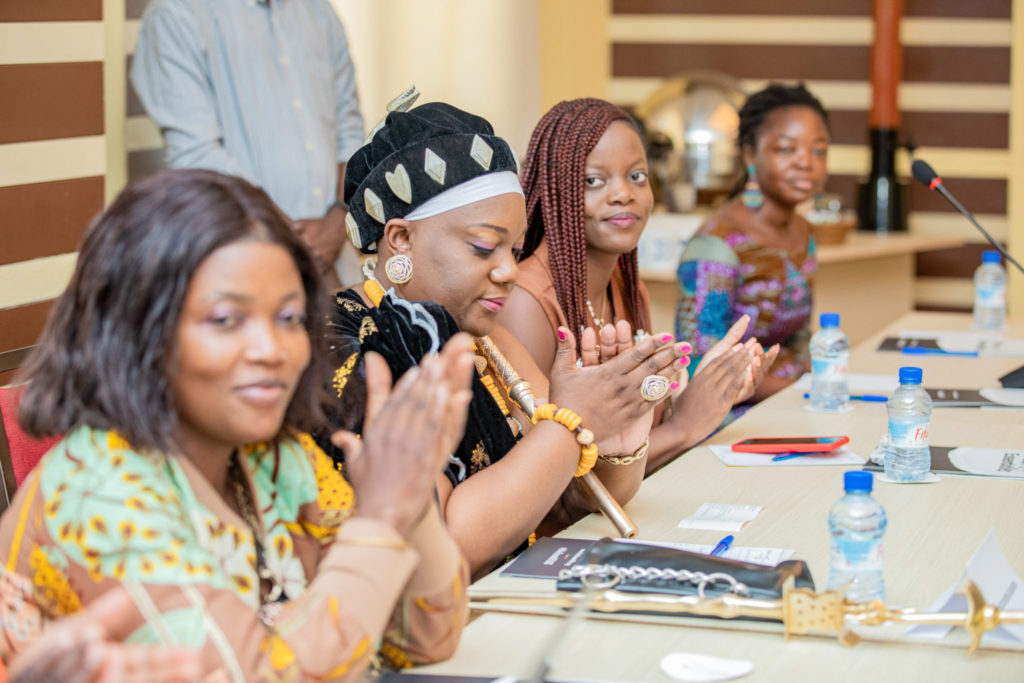
With this expansion, Voix EssentiELLES confirms its determination to foster the emergence of a new generation of women leaders capable of influencing decision-making and health policies and human rights in French-speaking Africa.
Thanks to the collective commitment of the 60 beneficiary organizations and our partners, this second phase promises to considerably amplify the already tangible impact of the project until 2027. Let's continue together to transform the future by empowering women and girls to participate fully in the decisions that affect them.
The annual 16 Days of Activism Against Gender-Based Violence (GBV) campaign offers an opportunity to unite energy, voices, and ideas around a common goal: eliminating all forms of violence against women and girls. To mark this mobilization, Speak Up Africa supported members of the Voix EssentiELLES Network in Burkina Faso, Senegal, and Côte d'Ivoire last November in implementing advocacy actions aimed at promoting women's participation in the fight against violence—whether medical, economic, physical, or sexual.
These discussion forums also highlighted the importance of private and public partnerships in combating GBV and integrating women's and community perspectives into the health and protection sectors.
Whether through panel discussions, sports workshops, or legal advocacy initiatives, these actions reflect the richness of approaches adopted by local women leaders to address the diverse challenges encountered on the ground.
The realization of women's rights cannot be achieved without access to healthcare. Following this philosophy, the Voix EssentiELLES Network in Burkina Faso was invited to host a session at the launch conference of the Burkina Faso Chapter of the African Women Lawyer Association last November, under the theme: "The Impact of Health on Women's Economic and Social Empowerment."
During this panel, Burkinabé Voix EssentiELLES members highlighted various community approaches that facilitate women's empowerment through health interventions.
Farida Sawadogo (IES Femmes) emphasized the importance of health and wellness-focused initiatives to strengthen women's autonomy. Toé Nadine (Association Against School Pregnancies) raised awareness about the impact of early pregnancies on young girls' development. Nana Pauline (Association for the Support of Vulnerable Women and Children) showcased efforts to combat GBV and the challenges of supporting survivors. Maïmouna Nacro (Association of Women with Disabilities Battling in Burkina Faso – AFHBB) highlighted the specific healthcare needs of women with disabilities, often overlooked in development policies.
These discussions underscored the vital role of health as a fundamental pillar of women's empowerment while demonstrating the transformative impact of local, women-led initiatives.
During the 2024 Scientific AIDS Days, held from November 26 to 28 in Dakar, the Voix EssentiELLES Senegal Network organized two interactive panels on the links between community health and the fight against GBV.
The discussions emphasized the crucial role of women and youth in prevention and advocacy, drawing from local organizations' experiences.
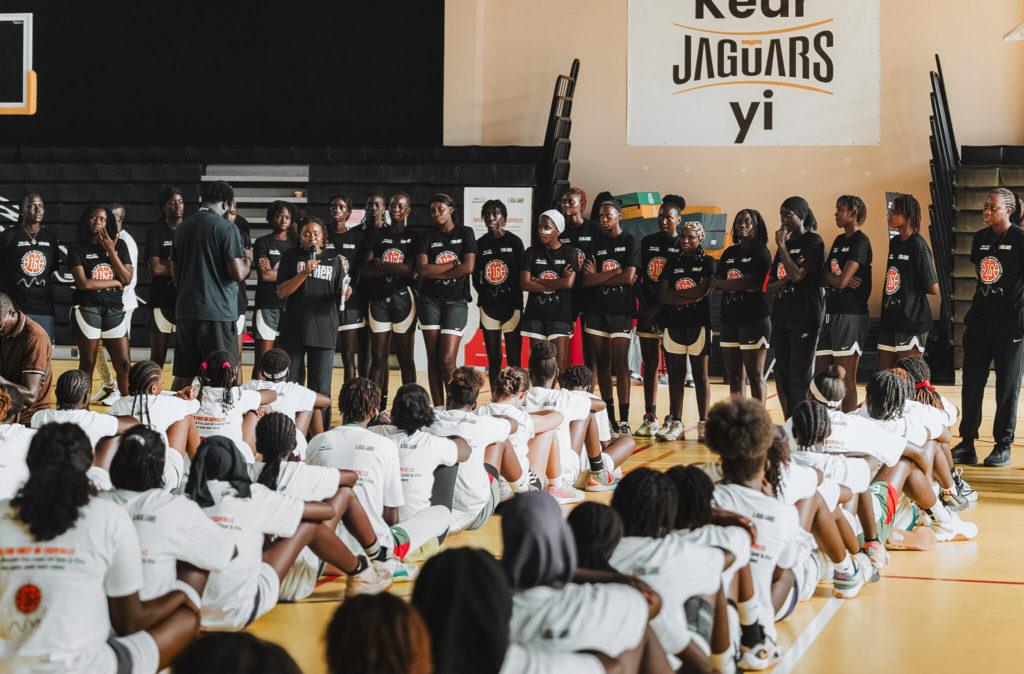
"Female leadership in health is not a choice—it is a necessity. With 70% of women in our organizations, we are the backbone of community action."
— Aissatou Mbaye Ndiaye, President of the CSVA
Organizations such as ABOYA, the Civil Society Monitoring, Alert, and Advocacy Committee (CSVA), and the Young Girls' Club of Kolda shared best practices from their field activities, such as integrating reproductive health services into HIV prevention efforts and developing digital tools to improve support for GBVs survivors.
These discussions also highlighted the unexpected role of community organizations as intermediaries between youth, public authorities, and healthcare providers, reinforcing the idea that access to quality healthcare is essential for breaking cycles of stigma and violence.
Additionally, on December 7 and 8, 2024, Speak Up Africa and the Basketball Africa League (BAL) brought together over 100 young female basketball players for a workshop combining sports and GBVs awareness.
Voix EssentiELLES leaders, including Sylvie Diack from the Young Girls' Club of Kolda, Fatoumata Sy from the Senegalese Association for the Future of Women and Children (ASAFE), and Mbissine Ndior from the Youth Network for the Promotion of the Abandonment of Female Genital Mutilation and Child Marriage (RJPAMGF/ME), shared their expertise on GBV prevention and leadership while raising awareness among young girls about the importance of consent, personal boundaries, and respect in sports.
This initiative demonstrated how basketball can serve as a powerful platform for promoting gender equality and empowerment, equipping young athletes to become champions of change in their communities.
In Côte d'Ivoire, the Voix EssentiELLES Network organized a panel on the holistic support of women affected by GBVs, bringing together experts, community leaders, and institutional representatives.
The discussions revealed challenges such as limited access to psychosocial and legal services while highlighting solutions based on collaborative synergies among key stakeholders.
Panelists emphasized that holistic support goes beyond psychological assistance—it must also include social, health, and economic dimensions to help survivors rebuild their lives.
Marie Louise Yao, a gender expert, also reminded the audience that denunciation is a crucial tool in reducing GBV cases while urging local authorities and social actors to strengthen protection measures for victims.
This Voix EssentiELLES initiative, which was the culmination of a campaign carried out across several Ivorian cities, marked a significant milestone in awareness efforts in Côte d'Ivoire. It encouraged communities to take an active role in ending GBV, illustrating once again the power of mobilizing local and collective approaches to advance gender equality and protect women's fundamental rights.
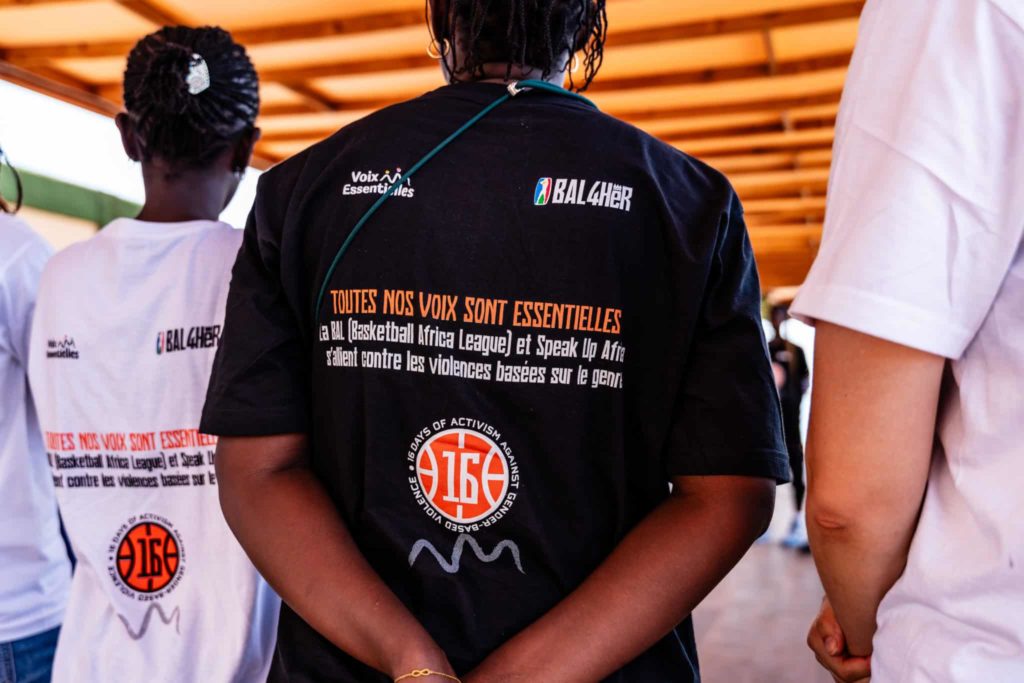
The initiatives carried out in these three countries reflect the diversity of approaches needed and the strength of collective action to end GBV. By supporting local women leaders, Speak Up Africa contributes to building societies where health, gender equality, and community well-being are priorities. These collective actions serve as a reminder that by uniting expertise, commitment, and resources, we can transform mindsets and build a more just and equitable future.
Each year, the 16 Days of Activism campaign (from November 25 to December 10) provides an opportunity to highlight initiatives and approaches that contribute to the reduction and eradication of gender-based violence (GBV) in our communities.
On December 7 and 8, 2024, Speak Up Africa and the Basketball Africa League (BAL) renewed their commitment to ending gender-based violence by organizing the second edition of their joint action to spotlight the importance of youth leadership and violence prevention in sports. The two-day event brought together young female basketball players, aged 10 to 23, for an engaging and educational experience that transcended sports, showcasing how empowerment and awareness can lead to societal change.
Acknowledging the transformative potential of sports, Speak Up Africa and BAL designed an initiative leveraging basketball as a platform to promote leadership and raise awareness among young girls about GBV. Three leaders from the Voix EssentiELLEs network—Sylvie Diack from “Club de Jeunes filles de Kolda”, Fatoumata Sy from “Association Sénégalaise pour l'Avenir de la Femme et de l’Enfant”, and Mbissine Ndior from “Réseau des Jeunes pour la Promotion de l'Abandon des Mutilations Génitales Féminines et des Mariages d'Enfants (RJPA-MGF-ME)”—played a key role as workshop leaders during the awareness sessions. These inspiring women brought their extensive experience in youth mobilization and intergenerational dialogue to the court, creating a unique space where education meets empowerment.
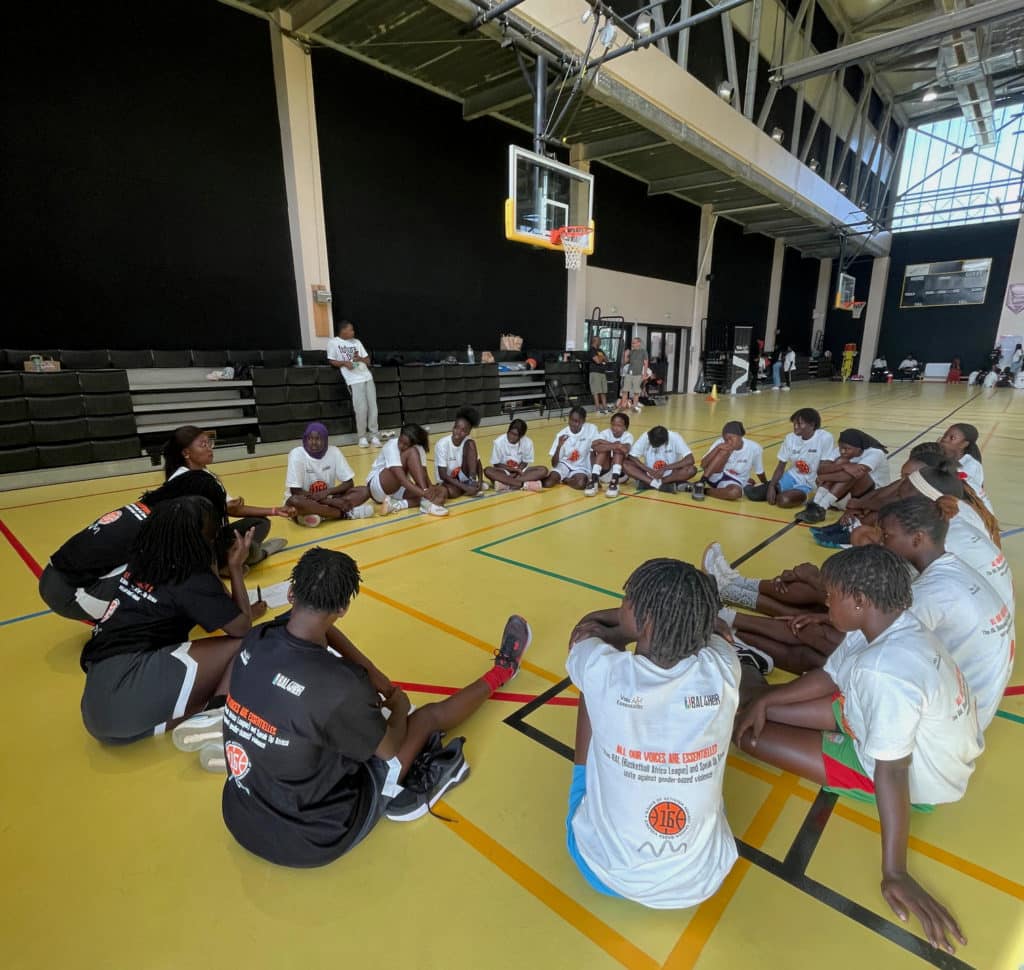
Highlighting Women’s Voices and Expertise
The involvement of Voix EssentiELLEs members emphasized the importance of prioritizing women’s voices and expertise in efforts to create inclusive and equitable communities. The workshop leaders focused on participatory activities and concrete examples to ensure that young participants could effectively identify and grasp the lessons.
On the first day, 30 young women aged 18 to 23 explored the many forms, signs, and impacts of GBV, as well as strategies to foster safe and supportive environments in sports, understanding concepts such as boundaries and consent.
On the second day, a younger group of 85 girls aged 10 to 15 joined the camp to gain the tools needed to advocate for themselves both on and off the court. Through exercises designed to identify situations in their daily practice where discrimination, abuse, or violence could occur, these young athletes showcased their confidence and strength as emerging champions of change within their communities.
Basketball served as a unifying force and a tool for solidarity throughout the event, teaching teamwork, communication, and advocacy. With the support of Voix EssentiELLEs, the players not only learned about gender-based violence and leadership but also witnessed firsthand how other women leaders drive change in their communities.
Inspiring the Next Generation
By the end of the event, the young athletes left with more than just improved basketball skills. They gained knowledge, inspiration, and a renewed determination to advocate for equality and combat violence in all its forms. The facilitators from Voix EssentiELLEs demonstrated that empowering young girls goes beyond the classroom or the court—it’s about equipping them with the skills and confidence to lead the change they want to see.
Together, Speak Up Africa and the Basketball Africa League showcased how organizations with shared values can amplify their impact by combining their resources, expertise, and platforms.
Based on an interview with Hawa Ba, Coordinator of AMFE SENEGAL-Association pour le Maintien des Filles à l'École at theUniversité Gaston Berger de Saint-Louis.
On the occasion of the 16 Days of Activism campaign against gender-based violence, Voix EssentiELLES gives the floor to Hawa Ba, a young leader committed to the fight against gender-based violence in Senegal and for equitable access to education for girls. Hawa began her career as president of the local unit of the Association pour le Maintien des Filles à l'École in Ansde Balla (Matam), and is now coordinator of the AMFE SENEGAL branch at the Université Gaston Berger in Saint-Louis. She tells us about her career.
Growing up in Asnde Balla, I witnessed a disturbing reality: young girls rarely had the chance to go to secondary school, as they were married off as early as the age of 13, often to much older men. For many of my friends, this was their fate. They were forced to give up their studies, abandon their dreams and concentrate on starting a family before they had a chance to understand who they were or even what they wanted to become.
This injustice was the fire that fueled my passion to fight for gender equality and against gender-based violence (GBV) within the Senegalese association AMFE (Association pour le Maintien des Filles à l'École) engaged under the Voix EssentiELLES initiative. I saw for myself the extent to which these harmful practices - early marriage and female genital mutilation (FGM) - are deeply rooted in tradition, making it almost impossible to change socio-cultural norms. Even with the support of my family, it was difficult to overcome stereotypes. Gender-based violence is a taboo subject in many communities, and it wasn't easy to engage in dialogue.
But with perseverance, dialogue began and barriers began to fall. It's essential to involve young girls in all health-related decision-making bodies, as they are the first to be affected by gender-based violence, and it's equally important to involve young men to promote positive masculinity. If young men understand the impact of GBV and the universal principle of human rights, they can be excellent allies in helping us change the discourse in our communities. The voice of young girls and boys is powerful, and their participation in awareness campaigns and peer-to-peer learning sessions is essential to creating lasting change.
Mentoring and leadership development
Mentoring has been a major influence in my leadership journey. Since 2020, I've had the privilege of being guided by Woppa Diallo, AMFE's founding president. Her confidence in me showed me that I could turn my dreams into reality and, more importantly, that I had the responsibility to act, and I was able to climb the ladder within the association. In 2023, I took part in the "She for Her - Ambassador for a Day" program, where I met the Finnish ambassador. Seeing her in such a leadership position was a revelation. It reaffirmed my belief that women are just as capable as men of taking on important roles and making impactful decisions.
Bringing about real change in the community
Since joining AMFE, I've seen our advocacy efforts begin to bear fruit. One of the biggest challenges for girls in my community was the lack of access to secondary schools. Parents didn't feel comfortable sending their daughters to other towns to further their education, so only boys were allowed to continue their studies. To solve this problem, AMFE set up a system in which mothers in the schools act as guardians for these girls. They provide safe accommodation during the week, and the girls return home at weekends. This system has reassured parents, and today more girls are allowed to pursue higher education.
Another major advance has been the improvement in communication between parents and children. Our discussions on the dangers of early marriage and FGM have opened up a space for families to discuss these issues openly. Parents are beginning to understand more clearly the serious consequences of these practices on the sexual health and psychology of the girls concerned, and we are seeing them reconsider long-established traditions that are harming their children.
Our work doesn't stop there. We lobby political leaders, village chiefs and local authorities to ensure that harmful practices such as child marriage and FGM are abolished once and for all. We've even called on the Badienou Gokh, community godmothers who have the trust of the local people and can intervene when they see something wrong. Thanks to their involvement, we've been able to set up an alert and care system. In this way, we remain vigilant and responsive to cases of gender-based violence in our communities.
Looking ahead: a future without gender-based violence
Today, more people are taking part in our discussions, sharing their ideas and contributing to the cause. AMFE has grown, and new cells have been formed in which young people are taking over. Each of these cells has a mentor, someone the parents trust to guide the members and keep them focused on their goals. This system enables us to offer leadership opportunities to young girls and boys, and makes a real difference to the way the community perceives their role. Civic engagement, whether you're a young woman or a young man, is the key to social justice.
My vision of the future
Looking ahead, I see a future where women and girls in Senegal - and around the world - are empowered, where harmful practices such as early marriage and FGM are eliminated, and where all young people, regardless of gender, have equal access to education and opportunity. But for this vision to become reality, young people need to get involved.
To those who want to make a difference in their community, I say: "Start by believing in yourself. Believe in your ability to create change. Take the time to understand your community, and be patient. Change takes time. Listen to people's experiences, create a dialogue and involve others in the conversation. Finally, don't hesitate to get involved. Join activities, participate in discussions and become a player in the social justice movement. Together, we can change the world."
"Let the girls choose; dear parents, I beg you, Hear [our] will!"
By Farida Tiemtore, Founder of Héroines du Faso, Voix EssentiELLES du Burkina Faso and Member of the Global Fund Youth Council
October 2024 was packed with dynamic and inspiring events for global health, with youth at the forefront. As Voix EssentiELLES du Burkina and a member of the Global Fund's Youth Council, I had the opportunity to take part in the World Health Summit 2024 in Berlin and the Youth Health Summit, an initiative that brings young leaders together from different backgrounds and networks around a common goal: supporting the Global Fund's next Replenishment Conference in 2025.
Youth Health Summit: Co-created to support the fight against malaria and the Global Fund's 8th Replenishment Conference
The Youth Health Summit was organized by the RBM Partnership to End Malaria Youth Workstream and the Global Fund. The event brought together young leaders from different international networks such as the International Federation of Medical Students' Associations (IFMSA), the International Pharmaceutical Students Federation (IPSF), the Global Fund Advocates Network (GFAN) Africa and Asia, as well as the ONE organization, to brainstorm strategies that can unite young people’s voices in the fight against malaria and supporting the next Global Fund replenishment.
For me, this experience demonstrated the power of youth mobilization because it is clear that our determination and commitment are driving forces behind the Fund's resources, essential in the fight against HIV, tuberculosis and malaria. As Voix EssentiELLES du Burkina Faso and a member of the Global Fund's Youth Council, this summit offered me a valuable opportunity to share the reality of the many Burkinabe young people and women who are affected by malaria and facing the challenges of care. I was able to highlight the importance of youth participation in decision-making processes and access to international platforms. I was also able to discuss, with other committed young people, how we can get involved and come up with new ways of positively influencing global health financing. Together, we identified our strengths as young leaders and discussed the importance of mobilizing our communities through awareness raising campaigns, actively championing causes at national and international levels, and participating in research to support healthcare innovation.
The World Health Summit: Fostering trust and innovation for a healthier world
The World Health Summit highlighted important discussions on global health. I had the opportunity to attend strategic sessions such as the impact of Gavi and the Global Fund, health in the context of climate change, and the importance of investing in women's health. A session dedicated to innovation in the fight against malaria, organized by Friends of the Global Fund Europe in partnership with the private sector, also revealed promising solutions for eliminating this disease. In addition, I took part in a meeting of civil society partners with Peter Sands, Executive Director of the Global Fund. In this session, organized by the Global Fund Advocates Network (GFAN), the Executive Director first presented the Global Fund's priorities given the current context of multiple crises, ahead of the next Replenishment Conference, and also highlighted the key role of civil society and youth networks in mobilizing malaria-endemic countries.
Intergenerational dialogue: When young people and leaders join forces
One of the highlights of the World Health Summit was the Intergenerational Dialogue. Alongside notable figures such as Dr Michael Adekunle Charles, CEO of the RBM Partnership to End Malaria, and Peter Sands, Executive Director of the Global Fund, we discussed how to improve the involvement of young people in the fight against malaria. When I spoke, I stressed the importance of considering young people not just as a resource but as strategic players capable of providing innovative and sustainable solutions. As Voix EssentiELLES, I feel I have a special responsibility to ensure that the voices of young women from Burkina Faso and other African countries are heard at the highest levels of global health. I therefore called for greater support for young people, particularly in the fields of digital technology and community advocacy, so that we can have a significant impact in our communities. The feedback from leaders was encouraging and showed that young people’s potential is recognized, even if more structured support and funding are still needed to achieve our common goals.
Galien Africa Youth Forum: Women, youth and climate resilience
At the Galien Africa Youth Forum, held in Dakar, I was honoured to take part in a panel on the theme of “Climate and health resilience in Africa: Women and youth leading the way” on 23 October 2024. The discussions highlighted the impact of climate change on diseases such as malaria, and how young people, especially women, can be at the heart of climate resilience in their communities. My contribution focused on the importance of mobilizing young people to incorporate climate challenges into public health, with a special focus on malaria. This discussion reinforced my commitment to pursuing my digital initiatives, notably through my blog, in order to amplify the voice of women and promote their role in disease prevention. Participating in this panel enabled me to forge valuable links with other committed young people, sharing perspectives and solutions for strengthening our impact at regional level.
These events underlined a very important point: young people are not just the future, they are the present of global health. Through our passion and our energy, we have the potential to move the lines and actively contribute to a healthier world. For this impact to be sustainable, however, strong partnerships and structured support are essential. As a member of the Global Fund's Youth Council and Voix EssentiELLES du Burkina, I am convinced that we have not only the will but also the power to drive change in healthcare and in the global development ecosystem more widely.
Speak Up Africa has placed women’s leadership at the center of its strategic programming and, on the occasion of International African Women’s Day (IAWD), joins forces with the Voix EssentiELLEs network communities to reaffirm the commitment to the development and empowerment of women leaders across Africa. This year’s theme, “Investing in Women: Accelerating Progress,” calls for broad collaboration between governments, businesses, civil society, and individuals to advance gender equality and women’s empowerment.
Exemplifying this transformative progress, we celebrate Anne-Cécile Konan, President of the National Union of Disabled Women of Côte d’Ivoire (UNAFEHCI), who has been committed to the integration and inclusion of women living with disabilities in society for nearly 20 years. Based on the observation of an increased marginalization, lack of representation and access to resources, Anne-Cécile has led a compelling advocacy since 2006 to amplify the concerns of these populations and involve the communities of her central region in Côte d'Ivoire in health prevention. Her efforts have earned her recognition from local authorities for her awareness-raising activities on sexual and reproductive health and the fight against malaria. With the support and backing of religious and community leaders, as well as health authorities in her region, her association has been able to deploy more field visits to rural areas to raise awareness of the needs of people living with disabilities and their inclusion in access to health services. In addition, UNAFEHCI also addresses the livelihood issues of these populations with training programs and income-generating activities. The association is also a member of the women's section of the West African Federation of Disabled People and is a member of the Pan-African Network of Women with Disabilities.
Her community activism has been recognized internationally through her participation in the Hive Africa Global Leaders Program - a 3-day immersive workshop focused on community leadership, and a nomination to the HIVE Africa Hall of Fame at the awards ceremony on July 11 in Abidjan. HIVE Africa is a global community that supports leaders and social entrepreneurs committed to creating a better world through transformational leadership programs. This distinction highlights her influential role in improving health policies and the empowerment of women in Africa.
Participating in the HIVE Africa Hall of Fame has reinforced my belief that the empowerment of women, especially women with disabilities, is essential for the progress of our continent. By investing in their potential, we build stronger and more resilient communities.
Anne Cécile Konan
Anne-Cécile and her organization’s work under Voix EssentiELLES illustrates the catalytic effect of investing in women leaders on socio-political change and sustainable development. Their commitment has given a voice to often marginalized groups and shaped policies that directly impact their lives.
On this day that positions African women as agents of change and development, we celebrate Anne-Cécile Konan’s leadership and the collective strength of women across our network. Join us in celebrating these remarkable successes and continue to encourage African women in their journey towards leadership and empowerment. Together, let’s work for meaningful change and unity across our continent!
Launched in July 2021, the Voix EssentiELLES network is an initiative that currently brings together 39 organizations in Burkina Faso, Côte D’Ivoire and Senegal, around the development of the capacities of grassroots community organizations in awareness-raising and advocacy for the inclusion of women and their perspectives in health decisions. Adopting a pan-African vision of gender-focused advocacy, this initiative plans to expand to other countries in the French-speaking region of West and Central Africa over the next three years. The objective is to further strengthen women’s access to decision-making bodies, where promising results have already been recorded.
